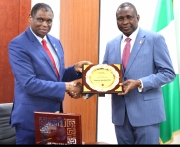
Ogun, Arise Integrated brainstorm to commence biggest garment factory in Africa
CITIZENS COMPASS—The Ogun State Government and the Arise Integrated Industrial Platform (IIP), an India-based multinational company, have put together a project implementation team for the takeoff of the biggest garment production company in the country.
The team is expected to identify what needs to be done and when, as well as to jointly establish a timeline for each task in preparation for the groundbreaking ceremony of the project in September this year.
Speaking when he received a delegation from the Arise Integrated Industrial Platform, led by its President, Mr. Gagan Gupta, and the representative of AFRIXEM Bank in his office at Oke-Mosan, Abeokuta, the State Governor, Prince Dapo Abiodun, noted with delight the enormous contribution the project would have on the economy of the state and the nation at large.
According to Prince Abiodun, with the capacity to produce 100 tons per hour, 1,000 tons per day, 40,000 tons per month, and about 350,000 tons per year, the factory would turn out about 4.4 million garments every day and employ between 120,000 to 150,000 direct and indirect laborers.
He said: “What we are here for today is to put together a project implementation team to identify what needs to be done and when, to jointly establish timelines for each of the tasks so that we can prepare for the groundbreaking of the project in September.
“What I find most exciting is how this project will resuscitate cotton farming and cotton growing in Nigeria and the ripple effects on the economy.
“Ogun State fortunately grows the highest quality cotton in Nigeria. We dedicated 10 hectares of land in the first instance for cotton growing. We have a very active grower association in our state.
“I am hoping that you find the right cotton inputs that you will make available to these farmers, and they will become the outgrowers. That way, you will take over the ownership of the entire process, and Offtake agreements would have been signed with them so that they know what is expected at harvest.”
He lamented that Nigeria, which was a leading garment-producing nation in the past, has lost its position to its neighbours, maintaining that with the project, the nation would regain its pride of place as a top producer of textiles on the continent.
The $2 billion investment, Prince Abiodun noted, would be sited at the Special Agro Processing Zone at the airport city and would turn the state into a garment hub not only in the country but Africa as a whole.
“I must also, in particular, appreciate our President, President Bola Ahmed Tinubu, for providing the enabling environment for the likes of Gagan Gupta to consider coming to invest in this sector and be so bullish as to have decided to commit this amount of funding alongside the bankers to this sector. We are looking at about $2 billion worth of investment,” he said.
Speaking, the President of the Group, Gagan Gupta, said his company, with many years of experience in textile manufacturing, is set to establish a world-class textile industry that would produce for Nigeria and the rest of the world.
He said Nigeria has the potential to be Africa’s textile hub, noting that though there is a decline in local production of cotton, the establishment of the industry would encourage cotton farmers, thereby boosting its position in the world.
The Chief Executive Officer of ATMS, Raja Rajaburu, said their visit to the state was to plan how the company would invest close to $2.25 billion in the production of garments in the state, which would employ close to 120,000 direct laborers, but indirect labor will be 2.5 times more than direct labor.
“Because of the infrastructure and the facilitation created by the Governor’s Office, we are really enthusiastic about putting the project in Ogun State,” he said.
Arvind Mathor, the Chief Executive Officer of Textiles at the Arise Integrated Industrial Platform, in his remarks said: “We are here to discuss the setting up of our industrial park. Basically, we think there is a huge potential for domestic consumption as well as future exporting in the region and ECOWAS.
“The environment is excellent; the support we’ve received, the promises made, and our experience from the recent past are all very positive, so we are very happy about it.”







